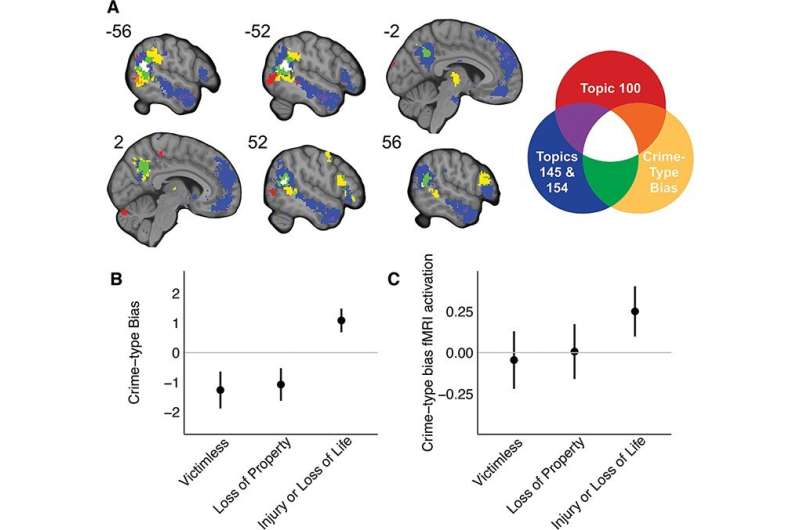This article has been reviewed according to Science X's editorial process and policies. Editors have highlighted the following attributes while ensuring the content's credibility:
fact-checked
peer-reviewed publication
trusted source
proofread
Neuroscientist investigates social cognition in biased juries

Bias in juries pose a serious challenge for judges and attorneys to conduct fair, equal and impartial trials. A recent paper published in Social Cognitive and Affective Neuroscience considers the overlap between social cognitive processes such as cultural and racial stereotyping and brain activity associated with bias against defendants accused of severe crimes.
R. McKell Carter, one of the paper's co-authors, is an assistant professor of psychology and neuroscience at the University of Colorado Boulder. He is an expert on social cognition: the processes of the brain that interpret the actions, intentions and expectations of others.
Carter's study examines the role of social cognition in crime-type bias, when jurors perceive the prosecutor's case stronger based on the severity of the charges against the defendant. Using functional magnetic resonance imaging (fMRI) scans on mock jurors, researchers mapped out regions of the brain that activated when jurors were presented with fictional case narratives and evidence.
After assessing the experiment's data, "We realized that people were deciding a little bit of guilt just on the accusation itself, and that it was comparable to the amount of guilt put toward a case where physical evidence is available," according to Carter.
In a murder case, for example, "If fingerprints are found right next to the body, that's similar to the amount of weight that would be given to somebody accused of murder. (They are) automatically assumed to be slightly guiltier."
Neuroscientists are split on what sorts of cognitive processes are most associated with biases that influence important social decisions. For the study's researchers, they wanted to discern whether affect (emotion), moral judgment or social cognition provided the best explanation for the neural processes linked with crime-type bias.
"By using brain data, we have an opportunity to know what parts of the brain should be active if somebody's considering moral judgment, emotional or social biases. We set out these individual cognitive models and then compare them to the brain data during the crime-type bias period" of the experiment, Carter says.
Researchers wanted to know, "What part of the brain is actually doing that work and making this person respond in a biased way?"
Using hypothesis-free and a-priori methods, Carter and his team compared the fMRI images of the mock jurors' brain activity with those found on Neurosynth, a database of fMRI data from thousands of published studies, which was developed at CU by Tor Wager. They found that cognitive maps associated with moral judgment and affect did not strongly match with crime-type bias, but social cognition, cultural and ideation bias did.
This overlap of brain activity took place mainly in the temporoparietal junction, an area responsible for collecting, integrating and processing information from the external environment.
This evidence "helps us think about why people might be behaving with crime-type bias. It's similar to the way people seem to have biased thinking about external racial groups, or people they might not typically view as part of their own social group," according to Carter.
The study intends to highlight to judges and attorneys how biased jury decisions might be caused by social cognitive processes, such as cultural expectations influencing how jurors interpret and predict the actions of defendants accused of serious crimes.
Crime-type bias "looks like it's relying on this area of the brain that is predicting what other people are doing next, or what I would do next," Carter says. "Bias against accused murderers might be well intentioned, "But certainly we're working toward overcoming this."
"So, the question is: How do we do the best job of achieving justice while still attempting to learn, generalize and predict what's going to happen in the future?"
For Carter, the study's findings that crime-type bias is associated with social cognition means that humans have the ability to change their outlook on others, and that bias in juries can be remedied.
"I think we have to do our best to provide situations where individuals can identify missed opportunities. If you saw murder cases where people were falsely accused, that might change your thinking. And maybe if we showed them cases with exonerating evidence, our subjects might show less bias," Carter says.
"I actually have a lot of hope that the more willing we are to recognize that these are constraints of the world and not constraints of our brains, the more space we give ourselves to try and solve these problems."
More information: Jaime J Castrellon et al, Social cognitive processes explain bias in juror decisions, Social Cognitive and Affective Neuroscience (2022). DOI: 10.1093/scan/nsac057
Journal information: Social Cognitive and Affective Neuroscience
Provided by University of Colorado at Boulder



















